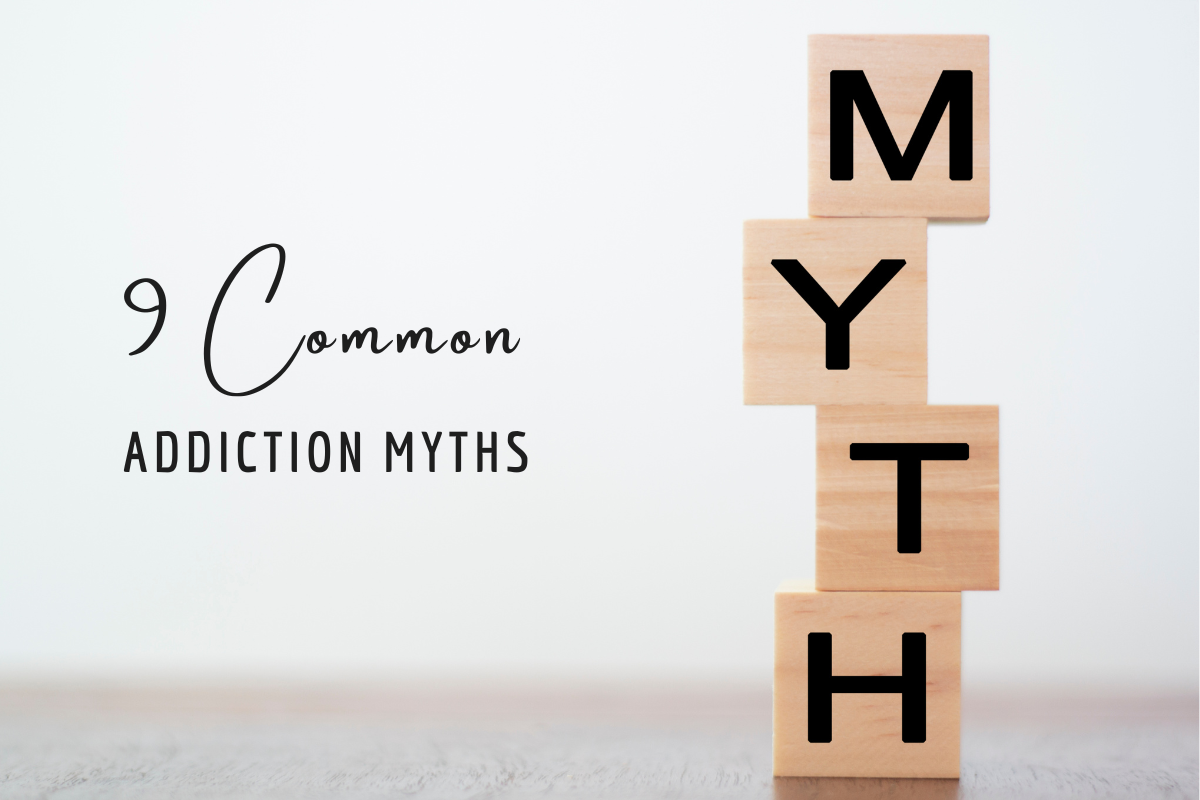9 Common Addiction Myths
Let’s explore some persistent myths about addiction that often cloud our understanding of this complex issue. There are many unhelpful beliefs about addiction and the process of recovery. It's time to shed light on these misconceptions and replace them with a more informed perspective grounded in compassion and science.
Myth #1: Someone must hit rock-bottom before they are ready for help.
There's a widespread belief that individuals must reach their lowest point before they're willing to accept help for their addiction. Waiting until things hit some devastating point prolongs the suffering. And it makes the process of recovery much more challenging. Recognizing that accessing support earlier can lead to better outcomes and reduce unnecessary harm is essential.
Rather than viewing rock bottom as a prerequisite for help, we should examine the barriers that prevent individuals from seeking assistance earlier, such as lack of resources, stigma, or shame. Addiction is likely the only health issue where anyone believes it is appropriate for someone to wait until they are at their absolute worst before any form of treatment will be beneficial.
Myth #2: Addiction is simply a matter of choice.
While the initial decision to engage in substance use may be voluntary, addiction is far more complicated than a mere choice. Genetic predispositions, environmental factors, and underlying mental health conditions all contribute to the development of addiction. Blaming individuals for their addiction oversimplifies a multifaceted issue and undermines efforts to address root causes that include mental health challenges or unresolved trauma. Most people struggling with addiction are self-medicating something.
Consider this fact: more than 80% of North Americans have consumed alcohol. However, about 10% develop an alcohol use disorder. Something else is happening for people who might initially "choose" to drink but then become addicted.
Myth #3: Willpower alone is sufficient to overcome addiction.
Many people believe that overcoming addiction is a matter of determination: if someone decides to quit, they should be able to do it. But if they struggle, they need more resolve or discipline. While these can play a supporting role in recovery, they are not enough to keep someone on the pathway of recovery. Willpower can play a role in recovery, but it's not the sole determinant of success.
What's going to help is a robust support system and working to address any underlying contributing factors such as trauma or mental health issues. The other important thing to know is that substance use and mood-altering actually impact the brain circuits tasked with good decisions and willpower. Addiction alters brain circuits responsible for self-control, making it challenging to resist cravings.
Myth #4: Relapse indicates a lack of commitment to recovery.
Relapse is a common and often frustrating aspect of the recovery process, but it does not signify a lack of effort or desire for change. Instead, it highlights the complexity of addiction and the challenges of maintaining sobriety. Relapse often occurs when individuals face triggers or underlying issues that have not been adequately addressed. Rather than blaming individuals for relapse, we must provide ongoing support and address the root causes driving addictive behaviours.
The problem is the problem: addiction is the symptom of the problem. Suppose someone only addresses the addiction without getting help for underlying trauma or mental health challenges. In that case, they've just removed one of their "coping tools" without getting support for the painful reasons they're self-medicating. Looking at it from this perspective helps us make sense of relapse patterns when unresolved problems are fueling the need to self-medicate.
Myth #5: “Tough love” is the answer.
Some believe that helping those struggling with addiction enables them. But the true definition of "enabling" is to shield someone from the consequences of their addiction. And sometimes "tough love" looks more like rejection, shaming, and punishment.
While setting boundaries is important, adopting a punitive approach can exacerbate feelings of shame and isolation, hindering the recovery process. Compassion, empathy, and support are far more effective in helping individuals overcome addiction and rebuild their lives.
Myth #6: There's a one-size-fits-all solution to recovery.
The recovery process is a deeply personal journey influenced by individual circumstances, preferences, and past traumatic experiences. What works for one person may not work for another. Recognizing and respecting these differences is essential for providing personalized and effective support to those struggling with addiction.
Many recovery tools contribute to the recovery journey. Someone needs to find what works for them.
Myth #7: Addiction is a moral failing.
Let's get one thing straight: addiction isn't a character flaw. Addiction is a complex health issue with biological, psychological, and social dimensions. Viewing addiction as a moral failing perpetuates stigma and hinders efforts to address it as a health and mental health issue. Addiction involves complex interactions between brain chemistry, environment, and personal history and is often linked to unresolved trauma or adverse experiences.
Shifting towards a compassionate and understanding perspective is crucial for supporting individuals in their recovery journey.
Myth #8: Participation in 12-Step programs is necessary for recovery.
Many people will argue that AA, NA or any other type of 12-step program is the only way to get help for addiction. While 12-step programs have helped many individuals on their journey to recovery, they're not the only option available. Various treatment modalities and support networks exist, and individuals should have access to various options to find what works best for them.
Twelve-step groups are fantastic resources, offering support to millions of people worldwide. Having a supportive community that provides tools and accountability is vital, but 12-step groups are no longer the only way to get that. Recovery is about finding what works – group therapy, counselling, or something else entirely. Finding what works to help someone pursue recovery is what matters.
Myth #9: Some people have "addictive personalities".
The concept of an "addictive personality" oversimplifies the complex factors that contribute to addiction. Research shows that it's more of a brain disorder than a personality issue. It's also tied to having a dysregulated nervous system, especially for those who have experienced trauma or adverse childhood experiences.
Understanding addiction as a complex interplay of factors helps destigmatize it and encourages the exploration of resources and tools that support recovery and healing.
By dispelling these myths and adopting a more informed and empathetic perspective, we can better support individuals struggling with addiction on their journey to recovery. It's time to replace judgment with understanding and stigma with compassion.

